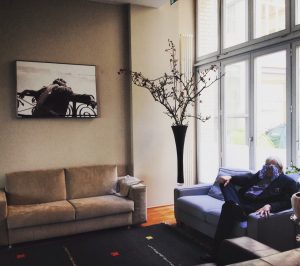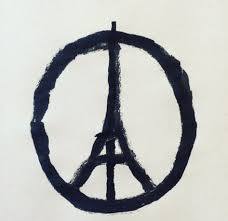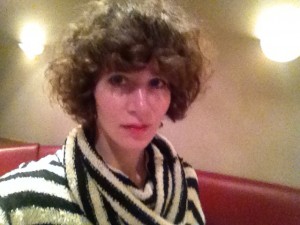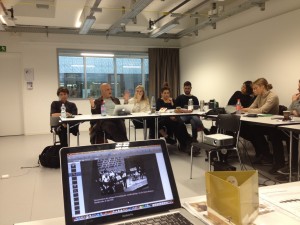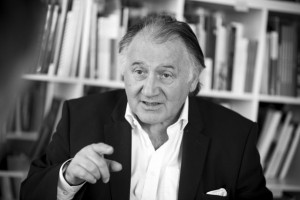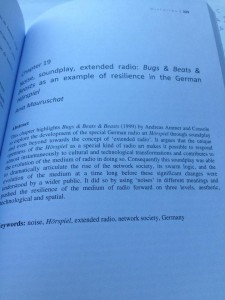Today Bazon Brock turns 80. Being an unique mixture of an artist and an polymath, Bazon Brock studied with Theordor W. Adorno, helped to bring Fluxus to Germany in the 1960th and was a close collaborator of Joseph Beuys and Wolf Vostell. Brock is emeritus Professor of Aesthetics and Cultural Education at the Bergische Universität in Wuppertal, Germany. He developed the method of “Action Teaching”, in which the seminar hall becomes a place for staging oneself and others. From 1968 until 1992 he launched the documenta-schools for visitors. As „Bazon“ is the Greek word for a talkative person, Bazon Brock developed talking and the mediation of art to an art form, always driven by on the one hand his fury against Hitlerism, which he suffered severely of as a child, being a refugee at the end of the Second World War from the east, and on the other hand by his euphoria to be alive.
Archiv der Kategorie: Electronic Art
Lecture „Catastrophes and the Noises of Radio Art in the Digital Age“
On Tuesday, the 17th of May I will present the current state of my dissertation project at the Research Colloquium of the English Seminar at University of Basel. I am very much looking forward to this event.
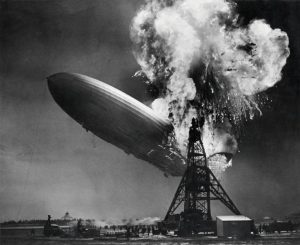
Crashing of the airship LZ 129 Hindenburg on the 6th of May 1937 in Lakehurst, New Jersey (USA). Herbert Morrison’s radio report about the catastrophe is one of the oldest documents of radio history. Foto credit: Sam Shere
This is what my talk will be about:
„The antagonism between the technological development towards perfectly clean digital radio sound and the common idea of radio as a noisy analogue medium is crucial for contemporary radio research. From a literary and media studies perspective this antagonism can be scrutinized very well in the extensive corpus of over 40 radio plays by the German radio artist Andreas Ammer. Especially three of his works, which he created together with the German noise musician FM Einheit, are examined thoroughly within my PhD project. These plays are “Apocalypse Live” (1994), “Deutsche Krieger I – III” (1995/1997) and “Crashing Aeroplanes” (2001). All three of them broach the issue of “the noises of radio art in the digital age” by the means of catastrophic plots.
A Revelation: Alan Macfarlane On Writing
I have written all my life: articles, features, essays, diaries, letters, columns, seminar papers, speeches, lectures. I have experienced writing as burden and as bliss. Writing never stopped to fascinate me. Still I felt unsatisfied with my way of writing. Most of the time I have written for money as I used to work as a journalist since my teenage years. This is certainly not the worst reason. But I always had this other longing. I wanted to experience a different kind of wirting and yet not a poetic, fictional one. I was looking and longing for way of writing about the world, about so-called „reality“ as well as about art I neither learned at school for journalism nor at university, especially not at German university. Eventually today a friend of mine drew my attention to this interview on writing with the British anthropologist Alan Macfarlane.
Radio portrait of Miranda July
On Sunday night, the 3rd of April at 10.05 pm my one-hour long radio feature „Wir und sie und alle die wir kennen. Die kalifornische Konzeptkünstlerin Miranda July im Portrait“ will be boradcast in German at Zündfunk Generator on Bayern2 (afterwards available as podcast). Based on my November 2015 interview with Miranda July and my interview with the scholar Antje Czudaj, who wrote a book on July’s intermedial art, I am analyzing her work in a wider context. In this portrait I am looking at Miranda July’s background in 1990s Riot Grrlism in Portland, Oregon and at her own art work alike: I will talk about her short stories and her debut novel, her films and her media art pieces. Especially I will focus on the interactive and webbased project „Learning to Love You More“ (together with Harrell Fletscher, 2002 – 2009) and her latest intermedial art work „Somebody“, a combination of an app and a wonderful short film, which the fashion label Miu Miu of Prada helped her to realize.Thus I strive to unravel her artistic concept and claim that Miranda July should be regarded as one of the most interesting artistic voices of the current generation.
The Answer
Three days after the terror attacks in Paris, four days after the massacer which the suicide bombers caused in Beirut, in the middle of the biggest refugee track through Europe since World War II, during an evil war in Syria and daily terror in Israel, Iraq and so many other places since decades: I still feel speechless and deeply sad. On the contrary to so many politicians and demagogues and their immediate response to the terror attacks. All over the planet they seem to know the answers right away and cannot wait to spread their verbal build-up of arms via any channel of communication. But their hatred and racism, their cry for war and revenge is no answer. It never was and it never will be.
Learning About Creativity from Miranda July
When I met the writer, film-maker and artist Miranda July in Zurich for an interview last week, I asked if I might take a picture of her with my smartphone. Sure, she said. But she just wanted it to be a true selfie – taken by herself.
Voice and Radio Art: Workshop with Eran Schaerf at the ZHdK
Tribunal & Clouds: GLOBALE @ ZKM
The Zentrum für Kunst und Medientechnologie (ZKM) Karlsruhe has opened again after several months of restoration. Within the next 300 days the festival GLOBALE will take place in the former ordnance factory: Many different exhibitions and symposia around the two main topics Infosphere and Exo-Evolution are in the making.

Real Cloud of Exo-Evolution by Transsolar – Foto: Harald Völkl, © ZKM | Zentrum für Kunst und Medientechnologie
The guided tour through the two clouds – symbolizing Infosphere and Exo-Evolution – which Peter Weibel, manager of the ZKM and media artist, gave to me in advance for Deutschlandradio Kultur can be found here.
Lecture „The BBC World Service: International Radio – Made in the UK“, 2015-06-18, University of Basel
Thursday, the 18h of June I will give a lecture on the legendary BBC World Service in the context of a workshop at the University of Basel. The workshop will be on international radio stations in the 20th century and is part of the national research project „Broadcasting Swissness“.
The title of my lecture, which will be in German as the whole workshop, is „The BBC World Service: International Radio – Made in the UK“. It is based on some findings of my Seminar „Special Sound“ about the BBC and the inspiring debates I had with my students in class. One of the results of this BBC seminar is our „Hitchhiker´s Guide to the BBC Radio Galaxy“, in which one of course also finds some information in English on the BBC World Service. In my lecture I will focus much more on the different attempts of delivering the identity concept of „Britishness“ via one of the oldest, largest and most famous radio stations to the world.
Update, 05-08-2015: The programme has been published now. Anyone interested is welcome to join, please just do register in advance.
New Publication: „Noise, soundplay, extended radio“
It is a great pleasure for me to announce that my first scientific article on radio art in English has appeared. After passing the double-blind peer review process of the ECREA Radio Research Section it just has been published in the book „Radio: The Resilient Medium. Papers from the third conference of the ECREA Radio Research Section„, edited by Madalena Oliveira, Grazyna Stachyra and Guy Starkey.
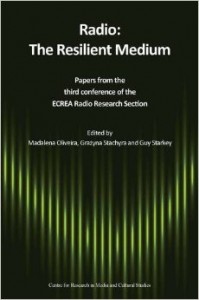 After I had the great opportunity and pleasure to present my PhD-project at the Radio Research Confernce in September 2013 in London it is of course also a very special pleasure to see the article printed now in English in a book, together with the articles of over 20 other radio researchers from all over the world. My very special thanks goes to Guy Starkey, Grazyna Stachyra and Madalena Oliveira for the great job they did in editing this wonderful book. Although Mauro José Sá Rego Costa was allowed to translate the article into Portugese and publish it in advance in the online-journal of the State University of Rio de Janero the English version only can be accessed via the book due to the copyright of the publishers to protect their investment in preparing the book for print.
After I had the great opportunity and pleasure to present my PhD-project at the Radio Research Confernce in September 2013 in London it is of course also a very special pleasure to see the article printed now in English in a book, together with the articles of over 20 other radio researchers from all over the world. My very special thanks goes to Guy Starkey, Grazyna Stachyra and Madalena Oliveira for the great job they did in editing this wonderful book. Although Mauro José Sá Rego Costa was allowed to translate the article into Portugese and publish it in advance in the online-journal of the State University of Rio de Janero the English version only can be accessed via the book due to the copyright of the publishers to protect their investment in preparing the book for print.
Nevertheless it´s certainly fine to tell the title of my article and to publish the abstract here:









